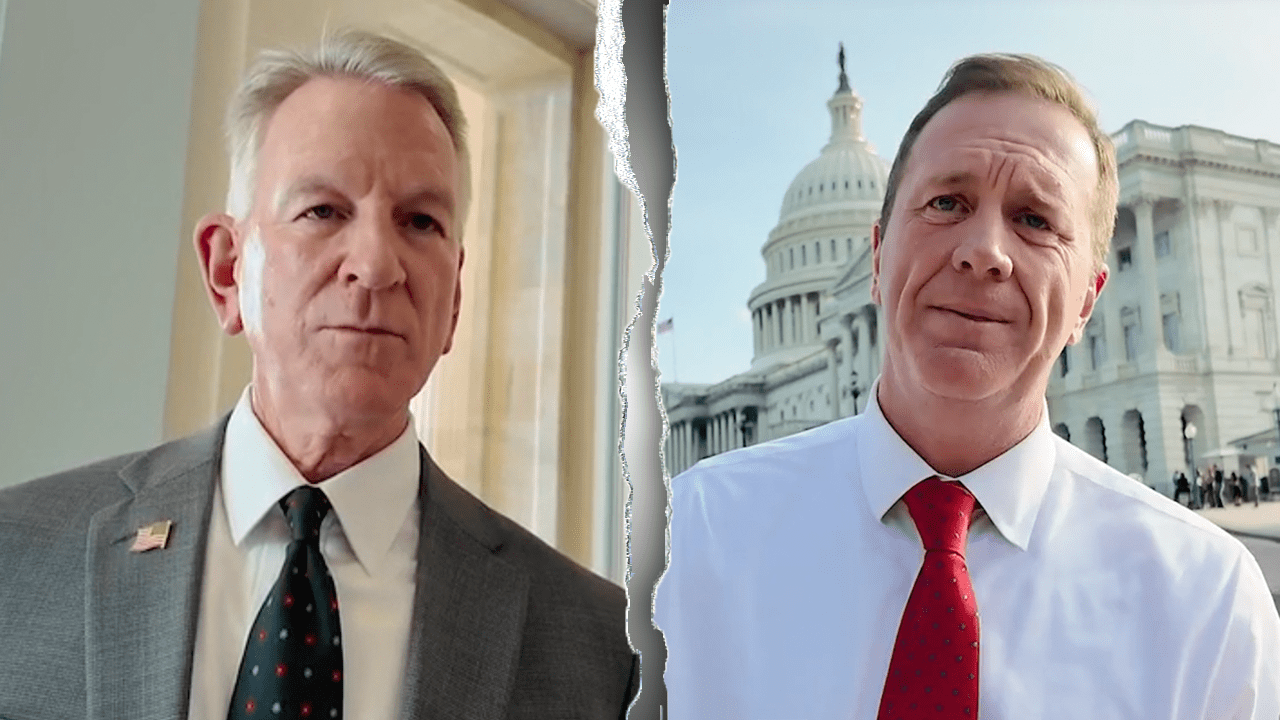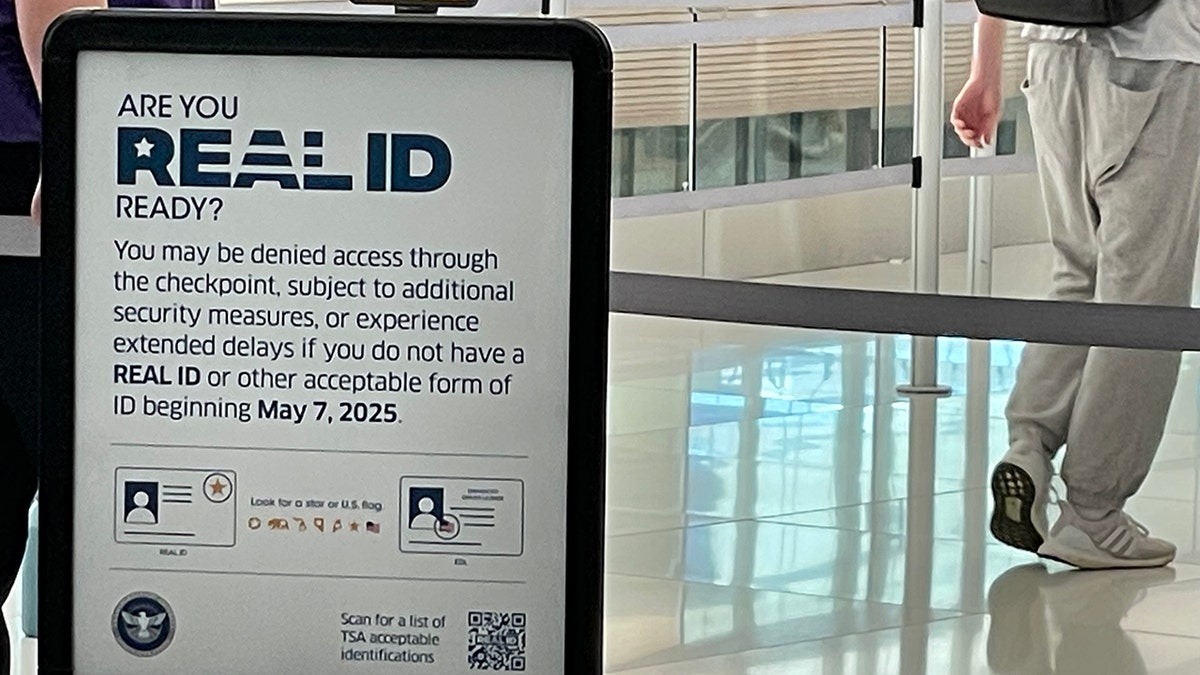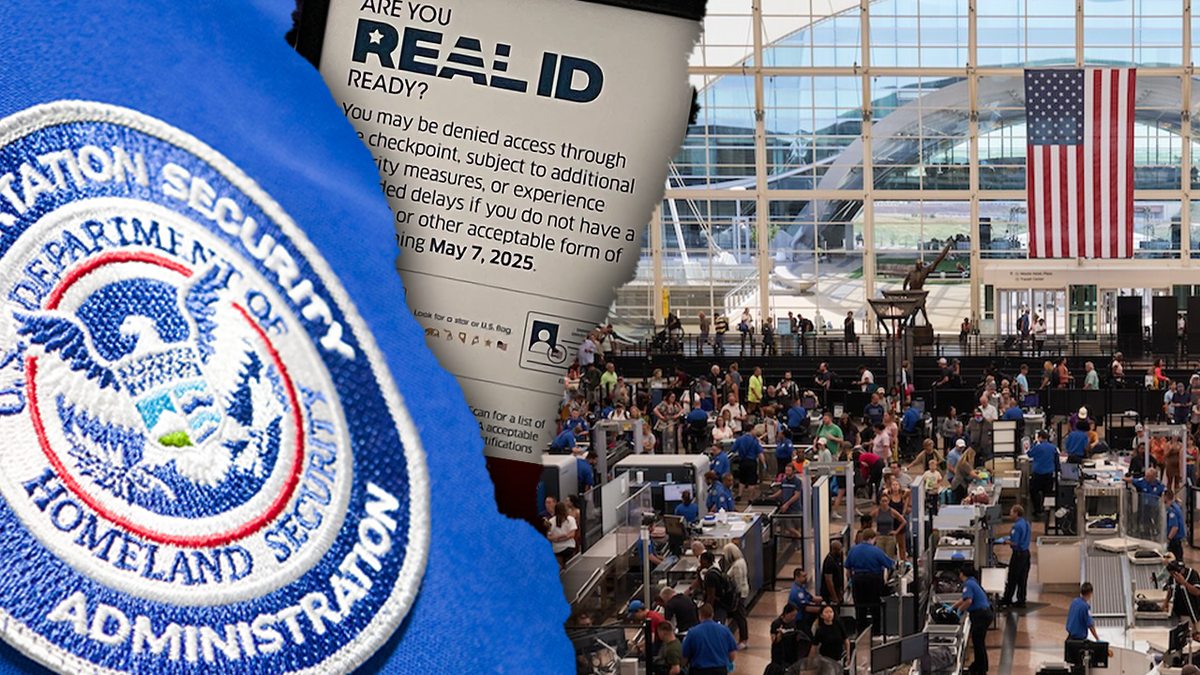INTERNACIONAL
Do we even need this? Lawmakers get real about REAL ID mandate starting today

The United States has had 20 years to roll out REAL ID.
Starting today, passengers must have a REAL ID or another accepted form of identification, like a passport, to travel domestically in the country.
Lawmakers on Capitol Hill spoke with Fox News Digital about how their home states implemented the final phase of REAL ID, as President Donald Trump‘s administration signaled there would be no deadline extensions.
«I had to go through all that to get it on my license, and that was a year or two ago,» Rep. Diana Harshbarger, R-Tenn, said. «Tennessee put that into effect a long time ago. If there’s a hard deadline now, people better get on the stick.»
While some Republican lawmakers expressed concern to Fox News Digital about their constituents not knowing or being able to get a REAL ID in time, most agreed REAL ID was a step in the right direction for national security.
PANDEMIC, PRICE TAGS AND PRIVACY CONCERNS: WHY IT TOOK 20 YEARS TO IMPLEMENT REAL ID
Sens. Tommy Tuberville, left, and Eric Schmitt, right, weigh in on REAL ID. (Fox News Digital)
Sen. Rick Scott, R-Fla., called REAL ID a «better way to prove who you are, and make sure there’s less fraud in the country.»
‘EXPECT WAIT TIMES’: TRUMP ADMIN SIGNALS NO EXCEPTIONS AFTER KENTUCKY ASKS FOR REAL ID EXTENSION
«It’s important that every state does the same thing,» Sen. Tommy Tuberville, R-Ala., said. «We can’t have some states doing one thing, some states doing the other. This is the United States of America, the last time I looked. We’re going to do it. Let’s all do it the same, do it the right way, take care of business, and go from there.»
Rep. Jeff Crank, R-Colo., told Fox News Digital that Colorado has not had any problems with REAL ID, adding, «Colorado’s gotten a lot of things wrong, but on REAL ID, I think they did a good job.»
Other states have not been as successful in their REAL ID rollouts.

Close-up shot of a sign prompting passengers to make sure they have a REAL ID before traveling. (Fox News)
Kentucky lawmakers, including Kentucky’s Senate Transportation Committee Chair Jimmy Higdon and 27 state Senate leaders, sent a letter to Homeland Security Secretary Kristi Noem on April 17 requesting a delay on REAL ID enforcement, citing concerns among Kentuckians «who are still unable to access driver’s licensing services due to limited appointment availability and long lines for walk-ins.»
The Trump administration confirmed in a statement to Fox News Digital that states would need to comply by the May 7 deadline, despite Kentucky’s delay request.
«What I’m concerned about is that constituents who may not be aware of the REAL ID requirement or that didn’t have time to get their REAL ID, will show up at an airport to go on a flight and realize they can’t fly domestically anymore without that REAL ID,» Rep. Nicole Malliotakis, R-N.Y., said.
Malliotakis said she has been trying to get the word out to her community that passengers will either need to get a REAL ID or travel with their passport starting Wednesday.

A TSA agent, DMV facility, and lines of travelers at a U.S. airport are seen in this split image. Passengers will need a REAL ID or other accepted ID to travel starting May 7. (Getty Images)
«I think the government needs to be more proactive and do advertisements. I would urge DHS and TSA to be doing that to get the word out there, so people can get their REAL ID as soon as possible,» she added.
However, Sen. Eric Schmitt, R-Mo., took the criticism a step further, telling Fox News Digital that REAL ID «has not really been talked a whole lot about in Congress, and we’re starting to get questions from constituents.»
CLICK HERE TO GET THE FOX NEWS APP
«We want to make sure that people have the ability to make accommodations, but the question is whether or not we even need this. We haven’t even had that debate in Congress. We should,» Schmitt added, despite Congress passing the REAL ID Act in 2005.
Rep. Dale Strong, R-Ala., had a different take. «Get the yellow star on your driver’s license, it’ll help you down the road.»
Politics,Immigration,National Security
INTERNACIONAL
¿Es malo hacer ejercicio antes de dormir?: esto responden los expertos

En los últimos años, varios estudios de gran escala han concluido que el ejercicio nocturno probablemente no interfiere con el sueño, mientras que otros siguen encontrando una relación negativa en ciertos contextos.
Leé también: Alucinantemente diversos: así eran los perros hace 10 mil años
Consultamos a expertos en sueño y ejercicio para que explicaran qué dice la evidencia sobre entrenar por la noche y cómo eso puede afectar el descanso, y para que compartieran las mejores prácticas para que una rutina antes de dormir funcione a tu favor.
Un ejercicio de intensidad moderada suele ser adecuado
Las investigaciones han demostrado de forma consistente que las rutinas de intensidad baja o moderada antes de dormir no perjudican el sueño, e incluso pueden favorecer un sueño más profundo.
Salir por la noche a caminar, un trote ligero o un paseo tranquilo en bicicleta –o realizar cualquier actividad que no eleve demasiado la frecuencia cardíaca– puede ayudar a reducir el estrés y liberar hormonas que generen bienestar, explicó Christopher Tanayan, cardiólogo deportivo de Northwell Health, en Nueva York. Agregó que el yoga y los estiramientos también pueden fomentar la atención plena, lo que prepara al cuerpo para el descanso.
Sin embargo, incluso algo bueno puede ser demasiado: algunas evidencias sugieren que realizar un entrenamiento de intensidad moderada extremadamente largo –por ejemplo, una carrera de tres horas– por la noche puede dificultar conciliar el sueño y afectar negativamente su calidad, dijo Josh Leota, investigador del sueño y autor principal de un estudio de 2025 que exploró la relación entre la actividad intensa en la noche y los hábitos de sueño.
Para el ejercicio de alta intensidad, la hora sí importa
Para los entrenamientos extenuantes, la evidencia es más contradictoria. Algunos estudios han encontrado que realizar una rutina de alta intensidad poco antes de acostarse tiene pocos efectos negativos sobre el sueño, pero otros sugieren que puede dificultar conciliarlo y mantenerlo.
Muchos expertos creen que los posibles efectos negativos se deben a los cambios fisiológicos que ocurren durante y después del esfuerzo prolongado. En particular, el ejercicio vigoroso eleva la temperatura corporal central, a menudo durante varias horas después de terminar la sesión. Además, el estrés físico activa el sistema nervioso simpático –conocido como la respuesta de “lucha o huida”–, que libera hormonas del estrés, explicó Tanayan.
El ejercicio nocturno intenso a veces dificulta el descanso (Foto: Ilustrativa/Adobe Stock)
Ambas respuestas pueden interferir con el ciclo del sueño. “Si tu temperatura corporal central permanece elevada, eso de hecho le dice a tu cuerpo que aún no es hora de dormir”, agregó. Aunque esto es especialmente cierto en los entrenamientos aeróbicos intensos, también puede pasar con el levantamiento de pesas o con cualquier rutina que someta al cuerpo a un esfuerzo continuo.
“Si el ejercicio es demasiado extenuante, aunque produzca beneficios psicológicos realmente positivos”, puede dejar tu cuerpo en un estado de exaltación que no favorece el sueño, dijo Leota, y agregó: “Es un equilibrio delicado”.
Pero la hora en que se realizan los entrenamientos nocturnos de alta intensidad puede marcar una gran diferencia. Si te gusta ejercitarte con intensidad por la noche y tienes cierta flexibilidad de horarios, procura ir al gimnasio al menos tres horas antes de acostarte, dijo Leota. Ese margen le dará al cuerpo el tiempo necesario para volver a su estado de reposo, señalaron los expertos.
Tal vez tengas que experimentar para encontrar la rutina nocturna que mejor te funcione
Si solo puedes hacer ejercicio por la noche, es mejor entrenar a esa hora que no hacerlo en absoluto, señalaron los expertos. También recordaron que la fisiología y la respuesta al ejercicio nocturno varían ligeramente en cada persona.
Averiguar qué es lo mejor para ti puede requerir algo de ensayo y error, dijo Michael Gradisar, psicólogo clínico y coautor de un estudio de 2021 sobre la actividad física nocturna y el sueño. No te limites a probar una sola vez un determinado régimen de ejercicio nocturno antes de decidir si te funciona, añadió, sino que “repítela una y otra vez”, prestando atención a cómo te sientes durante el día y a lo largo de la semana siguiente.
Si prefieres realizar entrenamientos intensos por la noche, la rutina adecuada podría implicar incluso elegir una o dos noches a la semana en las que duermas un poco menos para poder incluir ese ejercicio de alta intensidad, señaló Matthew Badgett, especialista en medicina del estilo de vida e integral en la Clínica Cleveland.
Leé también: Los expertos coinciden: el ejercicio puede ayudar a controlar el dolor que provoca la artritis de rodilla
En algunas personas, las decisiones que toman en torno a sus entrenamientos –como el lugar donde hacen ejercicio o la forma en que se alimentan antes y después– son las que interfieren con su descanso, explicó Jingyi Qian, investigadora del sueño en Mass General Brigham.
Sea cual sea el tipo o la intensidad del ejercicio que elijas, evita entrenar en un espacio muy iluminado cerca de la hora de dormir, ya que esto puede retrasar tu reloj interno del sueño, explicó Qian. También recomendó evitar las bebidas deportivas con cafeína y las comidas tardías, ya que ambas pueden afectar negativamente el sueño.
“Lo más importante es que no te desanimes a hacer ejercicio si solo puedes hacerlo por la noche”, dijo Qian. “Con un poco de autodiagnóstico y buenos hábitos de sueño, puedes encontrar una rutina que favorezca tanto la forma física como el sueño”.
The New York Times
INTERNACIONAL
Los líderes de seguridad europeos negociarán el plan de Donald Trump con Ucrania y EEUU en Ginebra: “Un trabajo en progreso”

Representantes de alto nivel de Estados Unidos, Ucrania y asesores de seguridad nacional de Francia, Reino Unido y Alemania se dan cita este domingo en Ginebra para analizar el plan presentado por Washington para un posible desenlace del conflicto en el territorio ucraniano.
El enviado especial estadounidense Steve Witkoff y el secretario de Estado Marco Rubio viajaron para participar de estos contactos, que se enfocan en pulir un documento que establece condiciones para un cese de hostilidades entre Kiev y Moscú. El secretario del Ejército de Tierra de Estados Unidos, Dan Driscoll, y su equipo ya están en la ciudad suiza para reunirse con la delegación ucraniana.
En el centro del debate está un plan de 28 puntos que condiciona el avance de Ucrania a concesiones territoriales, a la aceptación de restricciones sobre el tamaño de su ejército y al abandono definitivo de su objetivo de ingresar en la OTAN.
El presidente estadounidense Donald Trump estableció para su homólogo ucraniano, Volodimir Zelensky, una fecha límite —el próximo jueves— para brindar una respuesta definitiva al marco propuesto, advertencia que se reflejó en las discusiones bilaterales previas a la cita.
Según un funcionario estadounidense en diálogo con Reuters, señaló: “Esperamos pulir los últimos detalles… para redactar un acuerdo que les beneficie (a Ucrania)”. “No se acordará nada hasta que los dos presidentes se reúnan”, confirmó.

La reunión cuenta, además, con la presencia de los principales asesores de seguridad del grupo E3 (Francia, Alemania y Reino Unido), de la Unión Europea e Italia, ampliando el abanico internacional de interlocutores.
Keith Kellogg, enviado especial de Donald Trump a Ucrania, afirmó en declaraciones a Fox News que el plan presentado actualmente es “un trabajo en progreso”. En ese sentido, los aliados europeos de Ucrania remarcaron que el acuerdo “es una base que requerirá trabajo adicional”.
Diplomáticos alemanes indicaron que a Washington y Kiev se les envió un borrador de plan alternativo europeo basado en la propuesta actual, aunque los líderes europeos remarcan que la hoja de ruta de Estados Unidos “necesita trabajo adicional” antes de la fecha límite, pues consideran prioritario asegurar mayores garantías para el gobierno de Zelensky.
Por su parte, el mandatario ruso Vladimir Putin calificó la iniciativa como un punto de partida aceptable, aunque desde el Kremlin se prevé que Moscú objete aspectos concretos, especialmente la exigencia de retirada de territorios ocupados por sus tropas.
Desde Washington, la portavoz de la Casa Blanca, Karoline Leavitt, confirmó que el documento está aún sujeto a negociación y cuenta con el respaldo de Trump. Leavitt sostuvo: “Es un buen plan tanto para Rusia como para Ucrania, y creemos que debería ser aceptable para ambas partes”.
En vísperas de las conversaciones, Zelensky planteó el dilema al que se enfrenta Ucrania: correr el riesgo de perder su dignidad y libertad, o el apoyo clave de la Casa Blanca, si se avanza en los términos actuales del documento negociado.

El plan estadounidense contempla que Ucrania reduzca el tamaño de sus fuerzas armadas a 600.000 efectivos y que la cobertura aérea se limite al apoyo de aviones de combate europeos desplegados en Polonia. Además, la OTAN se comprometería a no emplazar tropas en suelo ucraniano bajo estos términos.
El acuerdo contempla que Kiev acepte reducir su número de tropas a 600.000 efectivos, que la OTAN no despliegue fuerzas en territorio ucraniano y que los aviones europeos de apoyo operativo permanezcan en Polonia.
Un revés para Zelensky, el acuerdo también plantea como condición central que su gobierno convoque a elecciones en un plazo de 100 días. Además, en el ámbito económico, el documento estipula que la reconstrucción de Ucrania se sufrague mediante 100.000 millones de dólares obtenidos de activos rusos congelados en el extranjero, bajo administración estadounidense.
Tras reunirse con representantes del Pentágono el jueves pasado, el mandatario ucraniano subrayó que cualquier negociación debe conducir a “una paz digna” para Ucrania, lo que implica salvaguardar la independencia, la soberanía y la dignidad del país. Según la oficina presidencial, Zelensky prevé discutir personalmente los pormenores del plan con Trump en los próximos días.
(Con información de Reuters)
INTERNACIONAL
La cumbre mundial del clima termina sin acuerdo sobre la reducción del uso de combustibles fósiles

La propuesta de Lula
«COP de la verdad»

 POLITICA1 día ago
POLITICA1 día agoTras la orden de decomiso de los bienes de CFK, la Justicia evalúa avanzar sobre el departamento de San José 1111

 POLITICA2 días ago
POLITICA2 días agoJavier Milei sobre las coimas en la ANDIS: “Hay mucha mala intención política”

 ECONOMIA3 días ago
ECONOMIA3 días agoEl Gobierno invierte USD 300 millones en la compra de 43 trenes nuevos para el AMBA




























